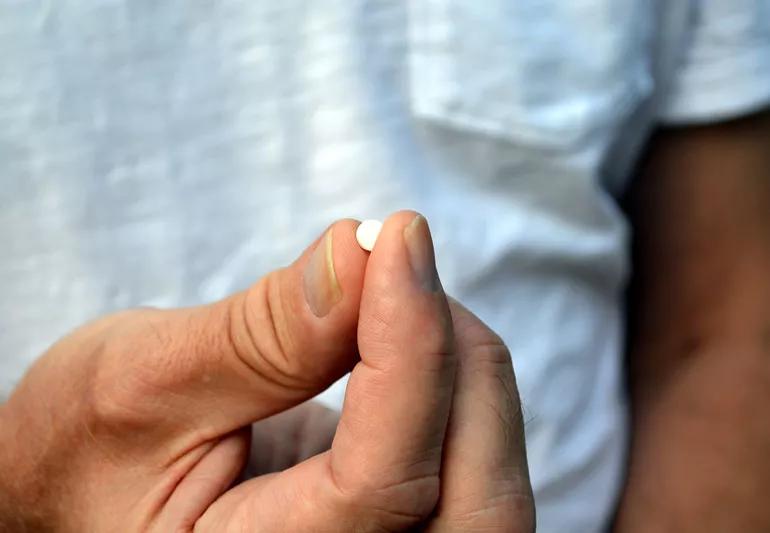A new study has some promising findings

Image content: This image is available to view online.
View image online (https://assets.clevelandclinic.org/transform/e39d5e8c-5aa9-4d78-8824-a89b938eaf3c/melatoninCovid-1034761702-770x533-1_jpg)
man taking melatonin pill
As several coronavirus (COVID-19) vaccine trials show promise, a new Cleveland Clinic study has shown that melatonin, which can regulate your sleep cycle and is a common sleep aid, could be a potential treatment option for patients with the virus.
Advertisement
Cleveland Clinic is a non-profit academic medical center. Advertising on our site helps support our mission. We do not endorse non-Cleveland Clinic products or services. Policy
The study comes from Cleveland Clinic’s Lerner Research Institute and focused on the repurposing of drugs that the U.S. Food and Drug Administration has already approved for new therapeutic uses, citing both efficiency and low costs.
Published in PLOS Biology, the study used two approaches that led to the finding and cross-referenced them, leading to a potentially key breakthrough in COVID-19 treatment.
First, an artificial intelligence platform developed by researchers at Learner compared the proximity between the host genes and proteins of SARS-CoV-2, the novel coronavirus that causes COVID-19, to that of 64 other diseases across a range of disease categories.
That data enabled researchers to find conditions with similar protein proximities to COVID-19 that already had drugs approved for treatment. Those drugs, the researchers propose, could possibly be used to treat COVID-19.
For example, researchers noticed that proteins associated with respiratory distress syndrome and sepsis, two main causes of death in patients with severe COVID-19, were highly connected to multiple SARS-CoV-2 proteins.
According to the study’s lead author, Feixiong Cheng, PhD, “That tells us that a drug that’s approved to treat those conditions may be capable of treating COVID-19 by acting on those shared biological targets.”
Advertisement
In all, researchers found 34 drugs as potential repurposing candidates including some, like the antibiotic azithromycin and the iron reducer deferoxamine, that are already being studied in COVID-19 clinical trials. And, yes, the list included melatonin.
Dr. Cheng points out that since COVID-19 “is a systematic disease impacting multiple cell types, tissues and organs,” those potentially complex connections between it and other diseases is essential to understanding complications caused by COVID-19 and those potentially repurposable drugs.
Researchers took that information and combined it with data collected from nearly 27,000 patients in Cleveland Clinic’s COVID-19 registry. The results? After adjusting for age, race, smoking history and various disease comorbidities, melatonin usage was associated with a 28% reduced likelihood of a positive COVID-19 test.
And when applying the same variable adjustments to African-Americans in the registry, the reduced likely increased to 52%. That’s an especially promising sign as African-Americans have been hit particularly hard by the virus.
That’s not to say this association between melatonin, which you can buy over-the-counter at any pharmacy, and COVID-19 is a sure thing. Nor does it mean you should up your melatonin intake immediately. There’s still a lot of research left to do.
Says Dr. Cheng, “It’s important to note that this doesn’t mean people should start taking melatonin without first consulting with their health care provider. We’re excited about these results and to study that connection more, but large-scale observational studies and randomized controlled trials are essential to confirm what we’ve found here.”
Advertisement

Sign up for our Health Essentials emails for expert guidance on nutrition, fitness, sleep, skin care and more.
Learn more about our editorial process.
Advertisement
The short answer: It’s complicated, but the basic care precautions still prevail, like washing your hands and isolating if you’re sick
They can feel like a typical headache or a migraine headache, but the pain can last for weeks to months
Any large social gathering — from a family birthday party to an indoor music concert — has the potential to spread serious infection
It’s important to connect with a healthcare provider, get quality sleep and balance your activities with your energy levels
Just like the flu, COVID-19 will continue to evolve every year
The duration varies, but symptoms can linger for a few days up to a couple weeks or more
Vaccination is best for prevention, but if you get sick with COVID-19, treatments are available
The virus lives best in humans, but it can last on hard surfaces, like doorknobs and railings
Type 2 diabetes isn’t inevitable with these dietary changes
Applying a hot or cold compress can help with pain
Pump up your iron intake with foods like tuna, tofu and turkey